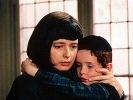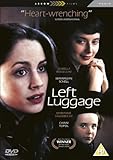Eye For Film >> Movies >> Left Luggage (1998) Film Review
Left Luggage opens with a sepia-tinted flashback explaining how a family fleeing the Nazis buried two suitcases full of heirlooms in their garden. Fast-forward to “present day” Antwerp (actually an unspecified year during the 1970s), and the man who buried them has begun an obsessive search for his lost belongings. His pretty, carefree and inoffensively rebellious daughter Chaja, meanwhile, is forced by circumstance to take a job as a nanny with a strict Hasidic family.
Chaja is doubtful about the job at first. She feels intimidated by the family’s rules and customs, their stern and laughably uptight patriarch (who refers her as a whore in Yiddish) and their building’s spiteful and bigoted Concierge. She also professes bafflement at the idea that anyone should be able to survive without cinema, radio and even – gasp! – television. However, within five minutes of meeting the family, her heart has been won by their shy four-year-old son who refuses to speak and whose sense of chronic anxiety causes him to wet himself. Will Chaja gradually come to respect the family’s way of life? Will the experience open her eyes and help put her back in touch with her own dormant Jewish identity? Will the family grow to love her because of - rather than in spite of - her feisty Western ways? Will she help bring the little boy out of his shell? Do bears defecate in woods?

To be honest, I don’t know what irritated me more: the film’s cosy predictability and thematic conservatism or its insufferably mawkish tone. Part of this is down to a shockingly pedestrian script, which is so devoid of insight, depth and personality that it might as well have been written by a computer programme (“It’s not the luggage your father lost in that filthy war” wails Chaja’s mother. “It’s himself!”)
But a more serious problem lies in the sheer crassness of Jeroen Krabbé’s direction. No opportunity to brutally tug the heartstrings is wasted, and whenever ambiguity or equivocation threaten to enter a scene (particularly one in which the dominant theme is either tolerance or prejudice), gratuitous reaction shots and asides are included to clarify what the correct “message” is. So little room is there for interpretation, that watching the film felt less like an engagement with characters and ideas and more like an inordinately boring and condescending lecture by a well-meaning but rather dim teacher.
Despite the idiotic material, seasoned professionals like Isabella Rossellini and Maximillian Schell manage to make it through the film with their dignity just about intact. Laura Fraser, on the other hand, in her first starring role as Chaja, is not so fortunate. Chaja’s character is sort of Erin Brockovich-lite. She’s mouthy but only in the service of principle and, although she’s self-confident, there’s never any suggestion that she’s arrogant, selfish or vain. On the contrary, the film goes out of its way to show us at every opportunity that beneath her occasionally brash veneer lie kindness, generosity and a profoundly humane sensitivity. An actress like Julia Roberts doing this shtick with a decent script and an experienced director is at least watchable, if not particularly interesting. A neophyte like Fraser doing it in the hands of a director as uninterested in subtlety, nuance and understatement as Krabbé is just embarrassing. And so, with dismaying predictability, and despite her obvious effort and enthusiasm, Fraser ends up giving possibly the worst performance I’ve ever seen outside of a film school short. Not wooden exactly, but cringe-inducingly earnest and completely misjudged.
This appears to have been a very personal project for Krabbé. He also plays the emotionally constipated patriarch and is credited (along with scriptwriter Edwin de Vries) as one of the film’s associate producers. In addition, he closes his film with a dedication, the inference of which seems to be that the decision to adapt the book was, at least in part, inspired by a personal tragedy mirrored in the film’s lachrymose final reel. But worthy intentions, no matter how sincerely or deeply felt, are no excuse for bad art. In fact, more often than not, they are the cause of it because they inspire in the artist a presumed sense of importance derived, not from their own talent or the worth of the material itself, but from the ostensible reason for producing it in the first place. If anyone wishes to see just how insulting and self-indulgent the end product can be, they ought to rent Left Luggage immediately.
Reviewed on: 23 Jul 2006



















